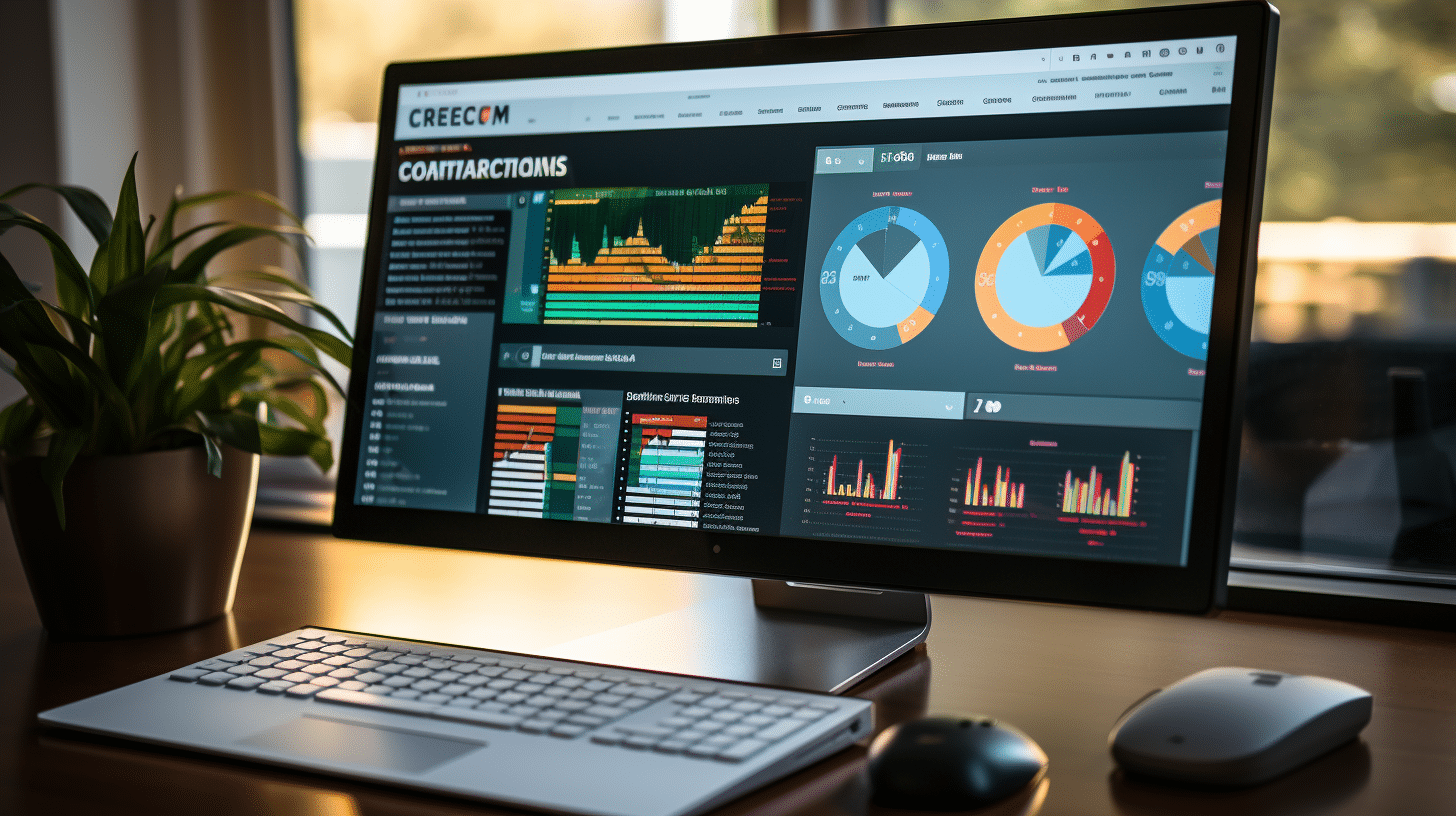
Digital transformation has changed the way we work. It has also made a substantial impact on the way individuals communicate, consume information, and build relationships. In this digitally-driven era of work and play, businesses must adapt to ever-evolving consumer needs and adapt to the way they operate. This is also the case in real estate, where agents must be able to accommodate their clients’ preferred mediums of communication and provide information, offers, and marketing material to their desired channels.
This is where implementing a real estate CRM can help streamline operations, capture all the relevant and valuable information that pertains to clients, enhance customer interaction, and improve overall efficiency. The purpose of this article is to shed light on how best to use a real estate CRM and how these can translate to measurable business results. Our analysis will delve into aspects such as implementation strategies for Real Estate CRM systems, techniques for maximizing their efficacy, and methods for measuring their success within your organisation.
Key Takeaways
- Automating tasks and processes in a Real Estate CRM maximises efficiency.
- Streamlining communication with clients and prospects is crucial for improved productivity.
- Accurate sales forecasts and reports are essential for effective planning.
- Analysing customer interactions and data points helps refine strategic approaches.
Implementing a Real Estate CRM

Implementing a real estate-specific Customer Relationship Management (CRM) system, when done correctly, can significantly enhance business efficiency and customer satisfaction.
The process involves several crucial steps:
- Selecting a suitable CRM system that aligns with the unique needs of the business.
- Setting up a comprehensive database to manage customer interactions effectively.
- Training staff adequately for seamless adoption of the new system
- Allows for compatibility with third-party software or systems for optimal performance.
Each step requires careful consideration and execution as they collectively influence the productivity of agents, sales operations, and marketing staff.
Setting up Your Database
Structuring a database efficiently is a critical step after you choose your real estate CRM solution. It requires careful planning and strategic organisation to ensure optimal operational performance and data accessibility
The process of setting up your database involves organising customer information into accessible formats, which can facilitate a streamlined sales process and enhance business efficiency. This strategy should revolve around improving customer engagement, fostering robust customer relationships, and enhancing customer service delivery through task automation.
A well-structured database also facilitates seamless customer interaction by providing readily available client profiles for reference during correspondence or meetings, significantly improving response times.
Furthermore, incorporating a systematic method for collecting and analysing customer feedback within the estate CRM system fosters informed decision-making processes that align with client needs and expectations. Such data-driven approaches aid in identifying potential areas of improvement in service delivery while simultaneously highlighting successful strategies worth maintaining or scaling up.
Training Staff on the New System
To harness the full potential of a real estate CRM platform, agencies should look for comprehensive training from platform providers to facilitate the onboarding process and guide change management. Both the sales team and sales managers must understand how to utilise this customer engagement platform, as it has the potential to enhance customer experiences greatly. The sales forecasting software feature in particular requires careful explanation, as understanding this component will allow your team to make more accurate predictions based on previous trends and data.
To structure the training process efficiently, consider implementing a three-fold approach: initial training, reinforcement, and ongoing support. This method ensures that employees not only get an introduction to the system’s features but also have their knowledge reinforced over time with additional guidance when required.
| Stage | Description | Tools Used |
| Initial Training | Introduce all features of the new system | Personalised demos |
| Reinforcement | Revisit key elements such as customer touchpoints and online customer engagement techniques within a few weeks after initial training | Scenario demonstrations |
| Ongoing Support | Provide regular updates about any changes or additions made in the CRM system; Solve doubts regarding the usage of specific features like sales forecasting software | Helpdesk support, Regular meetings |
Do bear in mind that premium support services may come with an additional cost due to the increased allocation of resources to accommodate client needs! For larger corporates, this may return a greater investment by accelerating the time for agent buy-in and leveraging CRM functionalities to optimise sales processes and generate stronger results.
Integrating With Third-Party Software/Systems
Integration of the chosen estate CRM system with existing third-party software and systems can be a critical point of consideration depending on the size of an agency. Integrations allow for multiple teams to access the CRM as a single source of truth and further improve workflows with automation. When considering subscribing to a CRM platform, look for the current integrations it offers and the flexibility of its architecture to allow for more custom builds.
The positive impact on business efficiency from integrating a real estate CRM system with third-party software extends beyond boosting sales revenue. It also improves customer engagement marketing by providing real-time insights into customers’ preferences, behaviour, and feedback. This type of data enhances agents’ ability to proactively meet client needs while reducing response time, effectively contributing towards overall business efficiency.
Maximizing Efficiency with a Real Estate CRM

Maximizing efficiency with a Real Estate CRM involves several strategic steps such as automating simple tasks and processes. For example, automated lead capturing and being able to store different forms of communication under one single roof, creating accurate sales forecasts, analysing customer interactions within lead generation channels, and improving decision-making capabilities based on data-driven insights.
Streamlining Communication with Clients and Prospects
Streamlining communication with clients and prospects is a critical outcome through the effective management of an advanced Real Estate CRM platform. The use of such a platform can result in improved business efficiency by providing tools to organise and manage all interactions with current and potential customers.
It can also aid the enhancement of customer engagement, increasing the likelihood of converting target customers into loyal ones. A well-designed CRM system can enable agents to record different interactions across multiple touchpoints, creating a comprehensive profile for each client or prospect for agents to continue nurturing.
The power of an estate CRM extends beyond just maintaining relationships; it also contributes significantly to customer retention. By facilitating consistent and relevant communication, CRMs help nurture stronger relationships leading to increased loyalty among clients. Furthermore, it allows businesses to identify potential customers who may be interested in their offerings based on past interactions or predictive analytics. This results in reduced time spent on non-productive leads and more focus on prospective clients who are likely to convert.
Creating Accurate Sales Forecasts and Reports
A survey by CSO Insights revealed that sales forecasting accuracy can be improved by up to 42% through the utilisation of advanced CRM systems in real estate firms. These systems provide robust sales forecasting tools that leverage historical sales data and pipeline dynamics to predict future sales. The integration of CRM systems into the operations of real estate firms enhances the forecasting process by providing insights into market trends, client preferences, and performance metrics. Real estate firms are thus better positioned to make informed decisions regarding their target market and strategic direction.
CRM systems offer diverse functionalities such as tracking interactions with clients, monitoring transaction history, and analysing performance metrics. This information is critical for creating accurate sales forecasts. For instance, if a CRM system indicates a trend where certain property types in specific locations have higher demand during particular seasons, these insights can be used in the formulation of future business strategies.
| Performance Metrics | Historical Sales Data | Pipeline Dynamics |
| Lead Conversion Rate | Total Sales Last Quarter | Deal Progression Speed |
| Client Interaction Frequency | Average Sale Value per Unit | Number of Deals in Pipeline |
| Transaction History Analysis | Seasonal Sale Trends | Potential Deal Value |
| Prospect Response Time | Property Type Demand Patterns | Forecasted Close Dates |
| Customer Retention Rate | Location-Specific Sales Data | Stages of Deal Completion |
In essence, the efficient use of an Estate CRM not only aids in generating accurate sales forecasts but also plays a pivotal role in enhancing customer relationships and retention rates effectively.
Analysing Customer Interactions and Data Points to Improve Strategies
With a touch of irony, it becomes evident that the treasure trove of data garnered from customer interactions can often remain untapped, despite its potential to significantly refine strategic approaches.
Analysing customer interactions within an estate CRM provides invaluable insights into customer behaviour and demand trends, which directly influence sales strategies and pipeline management. By utilizing analytical techniques such as data segmentation and pattern recognition, businesses can generate accurate sales forecasting based on past interaction data and market trends. This helps in understanding the fluctuations in customer demand over different periods or under varying circumstances. Thus, businesses are not just reacting to changes but proactively shaping their strategies based on predictive intelligence.
Sales forecasting is further enhanced by integrating real-time customer interaction data with historical sales patterns within the CRM system. This combination allows for the generation of an accurate forecast that takes into account both current market dynamics and past business performance. It enables enterprises to allocate resources more efficiently, improve their response times to changing market conditions, and ultimately increase profitability through more targeted decision-making processes.
As these benefits come to fruition, businesses will find themselves better equipped for generating leads through targeted marketing strategies in subsequent stages of their operations’ lifecycle.
Generating Leads Through Targeted Marketing Strategies
Targeted marketing strategies, when informed by a deep and thorough analysis of customer interactions and data points, can significantly boost lead generation efforts. Utilising CRM systems allows businesses to track various stages of the buying process, from initial interest to actual sales.
This intuitive forecasting ability provides insights into future sales performance based on current market trends. By employing statistical techniques for trend analysis within the CRM, businesses can adjust their marketing strategies, accordingly, thus optimizing their approach to generating leads through targeted marketing and hyper-personalised messaging.
Opportunity stage forecasting within a CRM enables businesses to gauge the size of sales pipelines and adapt their strategies proactively rather than reactively. This foresight empowers enterprises to tailor their marketing content and outreach methods specifically towards potential clients who are most likely to convert into actual sales. Integrating these strategic approaches promises a more efficient use of resources while increasing lead generation rates.
Measuring Success With Your Real Estate CRM

Monitoring and evaluating the performance of a Real Estate CRM is crucial in assessing its efficacy for improving business productivity. For instance, agencies may use specific metrics within their CRM such as lead conversion rates, average response time to customer queries, or time saved on administrative tasks to measure success and identify areas of improvement. These quantifiable indicators offer valuable insight into how well the CRM is performing and where it can be optimised to further improve business efficiency.
In line with best practices, estate agencies should regularly review these markers of success to ensure they’re achieving their desired outcomes. This process requires thorough data analysis, but a well-managed CRM system makes this task less daunting by providing easy access to relevant information.
The following table suggests some key metrics that businesses can track:
| Metric | Purpose |
| Lead conversion rate | To assess the effectiveness of marketing strategies |
| Average response time | To evaluate customer service efficiency |
| Time saved on admin tasks | To measure improvements in operational efficiency |
| Customer satisfaction score | To gauge client happiness with services provided |
| Revenue generated per lead | To determine profitability |
By diligently monitoring these metrics, businesses will be better positioned to make strategic decisions that enhance their operations and drive growth.
Sales Forecasting With CRM Platforms

Sales forecasting, an essential aspect of any business strategy, is a process that leverages historical sales data to predict future sales trends.
The primary beneficiaries of this process are key decision-makers in businesses such as managers and executives who base their strategic plans on these forecasts.
Utilising sophisticated forecasting software can provide accurate predictions, thereby aiding in effective resource allocation, managing cash flows better and ultimately driving business growth.
Frequently Asked Questions
What security measures can I take to protect my Estate CRM data?
Implementing robust password policies, enabling multi-factor authentication, and utilising data encryption can enhance the security of estate CRM data. Regularly updating software and conducting vulnerability assessments are also recommended practices.
How can I integrate my current software with an Estate CRM?
Software integration with an estate CRM is possible through Application Programming Interface (API) access. This allows seamless data transfer between systems, promoting efficient workflows and contributing to overall business productivity. Request your CRM provider to find out whether they provide APIs for the design you wish to connect to.
Can I customise the features of my Estate CRM to fit my specific needs?
Yes, customization of estate CRM features to fit specific needs is feasible. This flexibility allows for enhanced efficiency and productivity by aligning the CRM capabilities with the unique operational and strategic requirements of a business.
Are there any Estate CRM options designed specifically for small businesses?
Navigating the marketplace, indeed several estate CRM options cater specifically to small businesses. These solutions offer scalability, customisability, and cost-effectiveness, thus enabling smaller enterprises to manage customer relationships more efficiently and effectively.
How can I train my team to effectively use our new Estate CRM?
To effectively utilise a new estate CRM, training should encompass both theoretical understanding and practical application. This can be achieved through comprehensive workshops, online tutorials, hands-on sessions, and regular follow-up assessments for staff proficiency.
Conclusion
In conclusion, the implementation of an Estate CRM can significantly enhance business efficiency. This software aids in streamlining tasks, improving customer engagement and facilitating effective sales forecasting. Through this digital platform, real estate businesses can optimise their operations and achieve measurable success.
Consider the hypothetical case of a mid-sized real estate firm that experienced a 30% increase in client retention after implementing an Estate CRM. Such instances highlight the potential benefits of employing these sophisticated tools in the realm of real estate.
Therefore, investing in an Estate CRM proves to be a strategic move towards better productivity and profitability within this industry.
If you are looking to implement an automated marketing strategy for lead generation and management, speak with one of our consultants today to design a strategy tailored specifically to your needs.


